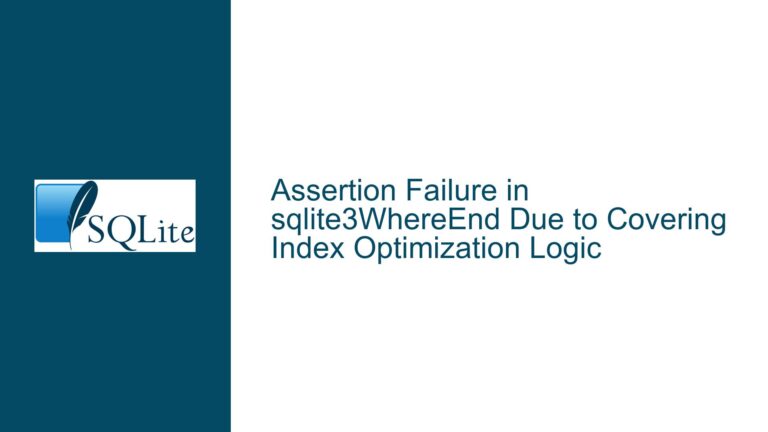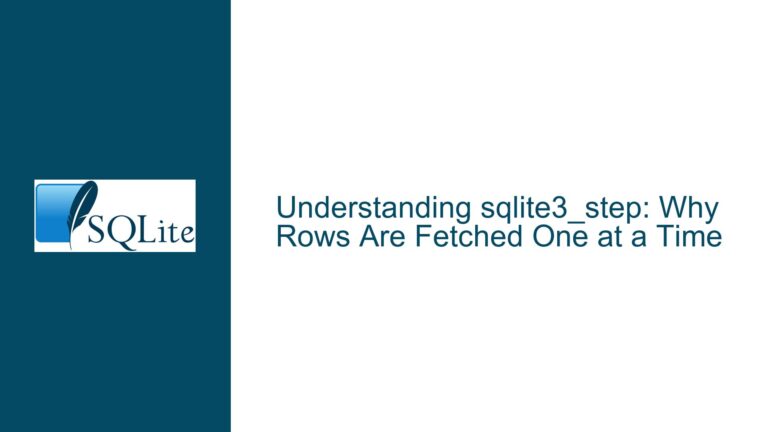SQLite Wasm OPFS Compatibility Issues in Safari and Firefox
Issue Overview: SQLite Wasm OPFS Compatibility in Safari and Firefox
The core issue revolves around the compatibility of SQLite Wasm with the Origin-Private File System (OPFS) in Safari and Firefox browsers. SQLite Wasm is a WebAssembly (Wasm) build of SQLite that allows running SQLite directly in the browser. OPFS is a browser API that provides a private, sandboxed file system for web applications, enabling persistent storage and efficient file operations. However, the integration of SQLite Wasm with OPFS has encountered significant hurdles in Safari and Firefox, primarily due to differences in browser support for OPFS and related APIs.
In Safari, the primary issue stems from the lack of support for certain OPFS features, particularly the inability to create and manage subworkers effectively. This limitation prevents SQLite Wasm from initializing the OPFS virtual file system (VFS) correctly, leading to unresolved promises and errors during the initialization phase. Additionally, Safari’s WebKit engine has historically lacked support for SharedArrayBuffer, a critical component for synchronizing communication between threads in SQLite Wasm’s OPFS implementation.
Firefox, on the other hand, has made progress in supporting OPFS, but the support is not yet consistent across all versions. While Firefox 111 beta and later versions have demonstrated out-of-the-box compatibility with SQLite Wasm and OPFS, earlier versions (e.g., Firefox 110) lack full OPFS support. This inconsistency creates challenges for developers aiming to deploy SQLite Wasm applications across different browser environments.
The discussion also highlights the role of Emscripten, a toolchain for compiling C/C++ code to WebAssembly, in these compatibility issues. SQLite Wasm relies on Emscripten’s virtual filesystem API, which has its own limitations and challenges when interfacing with OPFS. Specifically, Emscripten’s WASMFS API, which provides OPFS support, is still under active development and has been deemed unsuitable for SQLite Wasm due to its lack of granular file-locking support and portability issues on ARM platforms.
Possible Causes: Browser-Specific Limitations and Emscripten’s Role
The root causes of the SQLite Wasm OPFS compatibility issues in Safari and Firefox can be traced to several factors, including browser-specific limitations, the evolving nature of OPFS support, and the challenges posed by Emscripten’s filesystem API.
Safari’s Lack of Subworker Support and SharedArrayBuffer
One of the primary issues in Safari is its lack of support for creating subworkers within web workers. SQLite Wasm relies on subworkers to handle asynchronous operations in OPFS, such as file access and synchronization. When a subworker fails to initialize, the sqlite3InitModule promise remains unresolved, effectively halting the initialization process. This issue is compounded by Safari’s historical lack of support for SharedArrayBuffer, which is essential for thread synchronization in SQLite Wasm’s OPFS implementation.
Additionally, Safari’s WebKit engine has exhibited limitations in handling certain OPFS operations, such as navigator.storage.getDirectory(), which fails in subworkers with an InvalidStateError. This failure prevents SQLite Wasm from accessing the OPFS directory, rendering the OPFS VFS unusable. The lack of visibility into subworker errors in Safari’s Web Inspector further complicates debugging efforts, as developers are unable to diagnose the root cause of initialization failures.
Firefox’s Inconsistent OPFS Support
While Firefox has made strides in supporting OPFS, the support is not yet uniform across all versions. Firefox 111 beta and later versions have demonstrated full compatibility with SQLite Wasm and OPFS, but earlier versions (e.g., Firefox 110) lack the necessary OPFS features. This inconsistency creates challenges for developers who need to ensure their applications work across different browser versions.
Firefox’s OPFS implementation also differs from Safari’s in its handling of synchronous file operations. SQLite Wasm’s OPFS driver relies on synchronous file access handles (FileSystemSyncAccessHandle) for efficient file operations. While Firefox supports these handles, the implementation details can vary, leading to potential compatibility issues with SQLite Wasm’s OPFS VFS.
Emscripten’s Filesystem API Limitations
Emscripten’s filesystem API plays a critical role in SQLite Wasm’s OPFS integration. However, the API has its own set of limitations that contribute to the compatibility issues. Emscripten’s WASMFS API, which provides OPFS support, is still under active development and has been deemed unsuitable for SQLite Wasm due to several reasons:
Lack of Granular File-Locking Support: WASMFS’s file-locking mechanism is not granular enough to support multi-tab concurrency in SQLite Wasm. When a file is opened in OPFS via WASMFS, the API acquires an exclusive lock on the file, preventing other tabs from performing synchronous operations until the file is closed. This limitation makes WASMFS unsuitable for SQLite Wasm’s use case, where multiple tabs may need concurrent access to the same database.
Portability Issues: WASMFS has been reported to have portability issues on ARM platforms, such as mobile devices and Raspberry Pi. This limitation restricts the usability of SQLite Wasm in environments where ARM-based devices are prevalent.
Volatility and Incompatibility: WASMFS is still a "moving target," with frequent changes that can break compatibility between releases. This volatility makes it challenging for SQLite Wasm to maintain a stable OPFS integration using WASMFS.
Troubleshooting Steps, Solutions & Fixes: Addressing SQLite Wasm OPFS Compatibility Issues
Addressing the SQLite Wasm OPFS compatibility issues in Safari and Firefox requires a combination of browser-specific workarounds, alternative solutions, and ongoing monitoring of browser updates. Below are detailed steps and solutions to mitigate these issues:
Safari: Workarounds and Monitoring Browser Updates
Use Safari Technology Preview: Safari Technology Preview (STP) often includes early implementations of new features and bug fixes. Developers can test SQLite Wasm with OPFS in STP to identify and address compatibility issues before they reach the stable release. As of Safari 17 Technology Preview, the OPFS issues have been resolved, indicating that future stable releases of Safari will likely support SQLite Wasm with OPFS.
Avoid Subworkers in Safari: Given Safari’s lack of support for subworkers, developers can explore alternative approaches to handle asynchronous operations in SQLite Wasm. One potential solution is to use a polyfill or a third-party library that emulates subworker functionality. However, this approach may introduce performance overhead and complexity.
Monitor Safari’s WebKit Updates: Developers should closely monitor updates to Safari’s WebKit engine, particularly regarding OPFS and
SharedArrayBuffersupport. As browser vendors continue to improve their implementations, many of the current limitations may be resolved in future releases.
Firefox: Ensuring Compatibility Across Versions
Target Firefox 111 and Later: Developers should ensure their applications target Firefox 111 and later versions, which have demonstrated full compatibility with SQLite Wasm and OPFS. By specifying minimum browser version requirements, developers can avoid compatibility issues in older versions of Firefox.
Feature Detection and Fallbacks: Implement feature detection to check for OPFS support in the user’s browser. If OPFS is not supported, provide fallback mechanisms, such as using IndexedDB or other storage options. This approach ensures that the application remains functional even in environments where OPFS is unavailable.
Leverage Firefox’s Developer Tools: Firefox’s developer tools provide robust debugging capabilities for web workers and OPFS operations. Developers can use these tools to diagnose and resolve issues related to SQLite Wasm’s OPFS integration.
Emscripten: Exploring Alternatives and Custom Solutions
Use Custom OPFS VFS Implementations: Instead of relying on Emscripten’s WASMFS API, developers can use custom OPFS VFS implementations tailored to SQLite Wasm’s requirements. Projects like
wa-sqliteprovide alternative OPFS VFS implementations that may offer better compatibility and performance.Optimize File-Locking Mechanisms: For applications requiring multi-tab concurrency, developers can implement custom file-locking mechanisms that are more granular than those provided by WASMFS. This approach ensures that multiple tabs can access the same database without causing locking-related errors.
Monitor Emscripten’s Development: Emscripten’s WASMFS API is under active development, and future releases may address the current limitations. Developers should monitor Emscripten’s release notes and contribute to the project by reporting issues and suggesting improvements.
General Best Practices for SQLite Wasm and OPFS
Test Across Multiple Browsers and Versions: Ensure thorough testing of SQLite Wasm applications across multiple browsers and versions, including Safari, Firefox, Chrome, and Edge. This approach helps identify and address compatibility issues early in the development process.
Provide Clear Error Handling and User Feedback: Implement robust error handling to detect and respond to OPFS-related errors. Provide clear feedback to users when their browser lacks the necessary features to support SQLite Wasm with OPFS.
Stay Informed About Browser and Web Standards: The web platform is constantly evolving, with new features and improvements being added regularly. Developers should stay informed about updates to browser implementations and web standards, particularly regarding OPFS and WebAssembly.
By following these troubleshooting steps and solutions, developers can mitigate the SQLite Wasm OPFS compatibility issues in Safari and Firefox, ensuring a smoother user experience across different browser environments.






